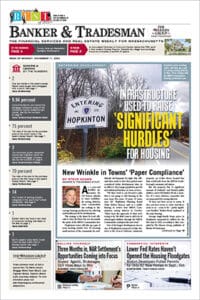Massachusetts politicians should look at Raleigh, North Carolina with a mixture of anger, envy and fear.
Despite clocking the highest level of apartment demand in the last 20 years in the fourth quarter of 2023, rents in Boston’s biotech rival to the south actually shrank, according to data from RealPage, a rental data company. The reason is straightforward: Thanks to permissive land-use policies and an easy financing environment in the first years of the pandemic, an explosion of multifamily construction delivered 11,566 new homes in a single year.
It’s not a one-off, either. Neighboring Charlotte, North Carolina clocked similar rent shrinkage and apartment supply growth according to RealPage, as did Nashville, Salt Lake City, Atlanta, Jacksonville and Orlando in Florida, and Austin, Fort Worth and Dallas in Texas.
While maybe not a great scenario for a multifamily investor who miscalculated how much they’d be able to charge for one of these new buildings, it’s an unalloyed good for every renter in these Sun Belt cities.
Envy
Here’s where the envy should come in: Boston never even came within shouting distance of that performance, delivering around 8,700 apartments in 2023 for a metro area with a population three-and-a-half times bigger than Raleigh’s. That kept landlords’ asking rents essentially flat at the metro level, Colliers reported, while the frequency of sweeteners like free parking that local landlords offered in September and October – the highest-demand months in Boston – stayed flat year-over-year, Zillow reported.
For any politician who purports to be a backer of working-class and middle-class Bay Staters, 2023 should firmly settle any and all arguments about the need to make building apartments as simple as applying for a building permit – no special permit or zoning reviews, no endless rounds of community input that delay or deter projects and force builders to charge higher rents.
The mantra must be: Build, baby, build! And then keep building to stay ahead of demand to live in this wonderful state!
But even as this attitude seems to be shared by more and more people statewide, we’re going to face an uphill climb getting there, thanks to the Federal Reserve’s high interest rates. Even the predicted rate cuts this year will likely not move the needle much, real estate observers and developers say. The region’s construction industry is sized for too little building, and added costs saddled onto development – from parking requirements to long review processes that rack up consultant fees – will still eat up most of the breathing room those cuts might create.
Anger and Fear
Here’s where the anger should come in: There are still enough vocal opponents of development in town governments that, as Greg Reibman points out in his column this week, local officials have plenty of incentives to “go small” with their plans to comply with the MBTA Communities zoning law. Newton officials, for example, created a zoning package that will require developers to acquire numerous, profitable retail properties if they want to build, something many have privately said is nearly impossible.
They’re generally a vocal minority – the 5,115 Milton residents who voted to reject that town’s transit zoning plan aren’t even one-quarter of the town’s registered voters – but they yell loud enough to make local electeds fear for their jobs.
Absent courage by some local officials, or early leadership by others that preemptively built a pro-housing consensus, we’re stuck with a tyrannical minority that’s holding our family budgets hostage and cause financial misery for many. As noble as efforts in Everett and other inner Boston suburbs have been to unleash apartment development, it’s just not going to be enough to keep up with job growth even as Raleigh and other communities do their level best to make their cities much cheaper places to live and therefore employ people, threatening to steal Massachusetts companies and jobs.
What Now?
While Reibman is right that everyone from Gov. Maura Healey and top business executives on down need to redouble their efforts to come out in support of good multifamily zoning, that’s not going to be enough.
The good news is that state legislators have a chance to move the ball forward on housing production this spring with the governor’s housing bond bill.
Specifically, they should reject criticism of statewide legalization of in-law apartment construction on single-family lots as overreach. This common-sense idea can, as California’s recent experience showed – 5,188 new ADUs permitted in Los Angeles in 2021, alone! – can generate meaningful numbers of new homes and build up the size of Massachusetts’ construction industry to help enable the building boom we need.
They should also look skeptically at the idea communities in Greater Boston should be able to charge an additional transfer fee on commercial properties – an added cost to any new housing development – and the idea that we should make it easier to jack up affordable housing mandates.
Los Angeles, again, provides a useful alternative in this latter case: By fast-tracking approvals for 100 percent-affordable projects and exempting them from onerous parking requirements and other cost drivers last year, Mayor Karen Bass unlocked 16,150 new units in only 12 months according to the news site CalMatters. Importantly, not a few of those required zero public subsidy thanks to the incredible cost savings developers secured from Bass’ changes.
It’s state legislators’ jobs to look beyond narrow, parochial interests and see our state’s needs holistically – something housing policy in this state desperately needs.
And unless and until we make a lot more opportunities to develop housing and show the average person that new development isn’t something to hate or fear, Massachusetts will lose its lunch to the South and Southwest.
Letters to the editor responding to this editorial or other topics may be submitted via email at editorial@thewarrengroup.com with the subject line “Letter to the Editor.” Submission is not a guarantee of publication.





